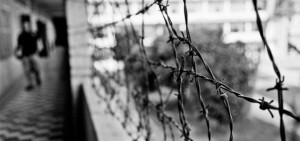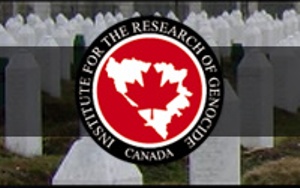Witness from Hell:To testify against Karadzic
(by Robert Leonard Rope, Institute for Research of Genocide, Canada)
After stumbling upon the following nightmarish testimony on the web in 2003, I contacted the Dutch journalist, Henny Korver, who assured me of its credibility. Following many months of calls and emails, I discovered that Ramiz had recently moved to the south of Holland to live with recently discovered relatives. He was faring considerably better, all things considered, and his cousin and I set up a date and time for an in-person interview.
For the planned meeting I traveled to Amsterdam, but all email and telephone communication between Ramiz’s family and myself abruptly ceased. Not easily deterred, I caught a train down to Maastricht. With the aid of other Bosnian refugees I eventually located the house, which had been temporarily vacated – a neighbor informed me they were “on vacation.” It suddenly dawned on me that Ramiz’s family had had enough of snoopy journalists, even well-intentioned ones. Ramiz had had more than his quota of pain for one lifetime.
asked his cousin once what Ramiz thought of our interest and concern. “He says he is grateful that someone in America should care about him,” was the reply.
Radovan Karadzic is currently on trial in the Hague, accused of ordering the commission of genocide and crimes against humanity. But when will Ramiz find justice?
Robert Leonard Rope, San Francisco, August 26, 2014
“This story is really too cruel to be expressed in words. It is told by the 46-year-old Bosnian Ramiz, whose complete family was massacred during the violence in former Yugoslavia. He was exposed to the most barbarian cruelties himself. He is a witness to the personal involvement of the Bosnian Serb leader Radovan Karadzic in the torturing that takes place in Bosnia.
Karadzic is likely to be indicted officially by the Yugoslavia Tribunal in The Hague for genocide and war crimes later this year. Although Ramiz’s fate is beyond all comprehension, and some therefore doubt the validity of his testimony, Amnesty International has compiled a report on his findings.
Deeply emotional, with wild gestures and a flood of words Ramiz actually cries out for help in his poorly furnished apartment in Amsterdam. He’s a short fellow with a lot of temperament who has lost tens of kilograms of weight as a result of the war in former Yugoslavia. He was blinded in one eye through torture, and when he bares his lower legs, the sinister signs of countless other cruelties come to light.
Completely on his own in Amsterdam, the Bosnian Muslim is struggling desperately to return to a normal life. But his story is so shocking and outlandish, that practically no one can imagine that it happened to a European fifty years after the victory over Nazi Germany. Yet, according to his own testimony, this is the man who was picked out of a group of 120 Muslim prisoners at Karakaj concentration camp (an old brick-works on de river Drina near the town of Zvornik) by Radovan Karadzic personally on May 28th 1992.
Kurban Bajram
Ramiz describes the savage events of that day : “It was clear that we were all going to be butchered. No one in this group would escape his fate. Karadzic had come to the camp together with Martic, the leader of the Croatian Serbs in the Krajina region, Vojislav Selesj, the extreme right wing Serb nationalist, and some others I did not know.
It was on Kurban Bajram , the Islamic day of sacrifice, when only adult masculine animals are slaughtered. Then a Serbian man named Stojan saved my life. He asked Karadzic to save my life, because he had known my father before the war, and had held him in high regard. Karadzic then said that I could leave the group.
To my disgust I heard later on that somebody else had had to take my place.” This was Iwan Palic, a roman catholic from Tuzla, with whom Ramiz had worked in the mines for years. Palic’s fate was, like that of the others, terrible. The Amnesty International report quotes Ramiz : “These 120 men were taken to a pit within the camp. They were massacred and dumped in the pit. The next day the other prisoners were led to the pit to look at the dead bodies. The river Drina was colored red by the blood and there were human heads floating around.”
To Ramiz it was a miracle that he had been saved by Radovan Karadzic. Yet he states without hesitation that the Bosnian Serbs’ leader is one of the most cruel war criminals in the region. From the almost daily television coverage the outside world knows Karadzic, who used to be a psychiatrist at Sarajevo’s University Hospital, as a well-dressed negotiator with high-ranking UN officials. But Ramiz knows another Karadzic :
“He used to come to the camp by helicopter from Pale almost every morning. It was only a ten minutes’ flight. That day I was summoned to Karadzic again, after they had made me look at the pile of corpses instead of killing me. He said to me : ‘From now on you’d better tell everybody that you are a Serb, and we will no longer torture you.’ But I replied : ‘No, I won’t do that. I am a Muslim, but I have Roman Catholic ancestors, dating back to the times of the Croat Kings.’
Then Karadzic took a big knife and stabbed me in my ankle. That was nothing special. He came to the camp every day and people were tortured and killed in his presence.” There is only one thing left in life that Ramiz wants to do: to testify at the Yugoslavia Tribunal at The Hague. Staff at the Tribunal support his view that Karadzic is one of the worst war criminals.
The prosecutor, the renowned South African judge Richard Goldstone told this paper : “Karadzic and his chief commander General Mladic are under suspicion of committing crimes against humanity. We will not only prosecute small fish, but we shall deal with the big ones as well.
Just six years ago Ramiz’ future looked bright. He was married to Zafra and the couple had a young son by the name of Mirsad and a daughter named Mirsada. “I had been working in the mines for over 22 years, so I could retire early. With the money I had saved in the bank we had bought a house in Vukovar, Croatia, where my wife and my son took up residence. My daughter, who attended primary school, stayed with me in Tuzla for the time being, but then the war broke out and everything changed all of a sudden.”
Wrong
“After Tito’s death it became soon clear that everything was going to go wrong in Yugoslavia. For the heavy work that we did as miners we received six months extra pay each year. That money was deposited in a pension fund. But with Tito dead, his successor Milosevic scrapped the whole scheme for Muslims. All of our money was gone.”
At the end of 1991 the dire consequences of the war hit Ramiz. Communications with Vukovar broke down as a result of the fighting and for weeks he and Mirsada knew nothing about the situation of his wife and son on the other side of the front. In November 1991 he got the message from Zagreb that they had been killed during a bombardment and buried in a mass grave. Some months later, at the end of March 1992, Ramiz was forced to take up arms himself, as Tuzla came under Serbian fire. “We had no weapons, the only thing we could defend ourselves with was the dynamite that we had access to as miners.”
This, of course, did not suffice to resist the Serbian attacks. On April 18th Ramiz and 80 other miners were taken prisoner and marched off to the brick-works at Zvornik, where a total of 2000 people were detained. Two days later he was severely tortured in front of some 300 other prisoners.
From the Amnesty International report : “They started hitting me with a rubber truncheon at least 50 centimeters long. They hit me on my head, my back, all over my body. Finally they pushed the truncheon into my right eye. As a consequence my iris came loose. On April 28th four Serbs came at me in the big hangar. Three of them held me by my arms and my legs while the fourth hammered nails in my toes. A month later, on May 24th, they used a metal bar with a crescent at one end as a branding-iron on my head.”
The scar is still clearly visible. The Franciscan nun Sister Christina from Brunssum took care of Ramiz upon his arrival in The Netherlands : “When he arrived here he was a wreck, both mentally and physically. He was in a very poor state and he was aching all over his body. He’d also become a heavy drinker. And not without reason, because after all the hardship he had suffered, again something terrible happened.”
On July 19th 1992 Ramiz had been one of the Muslims who were exchanged for Serb prisoners. He had gone to his house in Lukavac and had picked up his daughter Mirsada, who had stayed with relatives while he was imprisoned. Sister Christina confirms the cruel story, which was also detailed in the Amnesty report: “His wife and his little boy died from shrapnel in a grenade attack. After he had been set free he was attacked by Serbs from a neighboring mountain village, with whom he’d always had a friendly relationship. Ramiz had been tied up with wire and before his eyes his nine year old daughter was raped several times before she was killed. They cut off her head and threw it on his lap.”
Hospital
It is almost unimaginable that Ramiz will ever be freed of his wartime traumas. One day after the ordeal in his house he was found by someone who heard him screaming. He was taken to a hospital in Zagreb where he immediately had to undergo surgery as the wire around his legs had been so tight that it had caused a thrombosis.
“After the Red Cross had stepped in, I got on a train to the Netherlands on September 16th, where medical treatment continued at Utrecht University Hospital. Through a fast procedure I quickly received refugee status, and some time later I arrived at the refugee center De Tieder in Brunssum, where they took care of me warm-heartedly. Yet, three years after his ordeal, Ramiz still is a shattered human being.
After a lot of roaming he finally came to the Amsterdam refugee center Abri which helps refugees with the worst psychological problems. But even here they could not help him. Ramiz became a wanderer in the desert. The language problem made matters even worse for Ramiz. That’s why he asked for help at the national Refugee Care Center to write a letter to Queen Beatrix. It was sent on January 4th 1994 and it was the ultimate cry for help. The Director of the Queen’s Cabinet replied that the letter had been forwarded to the Government Minister of Welfare, Health and Culture.
“That’s the last thing I’ve ever heard of it,” says Ramiz, despairing. Completely on his own now, he roams the streets of Amsterdam. Who in Heaven’s name can help this man ? A member of Abri’s staff explains : “He wants to tell his story to everybody, but it is so horrific that it is met with repulsion. There are times when I think, maybe I do not want to believe it, because it is so horrifying. My mind won’t allow it to be true.””
{From De Telegraaf, May 27, 1995, Amsterdam, by Henny Korver & Ron Couwenhoven, translated into English by Ayhan Irfanoglu and Frank Tiggelaar)


